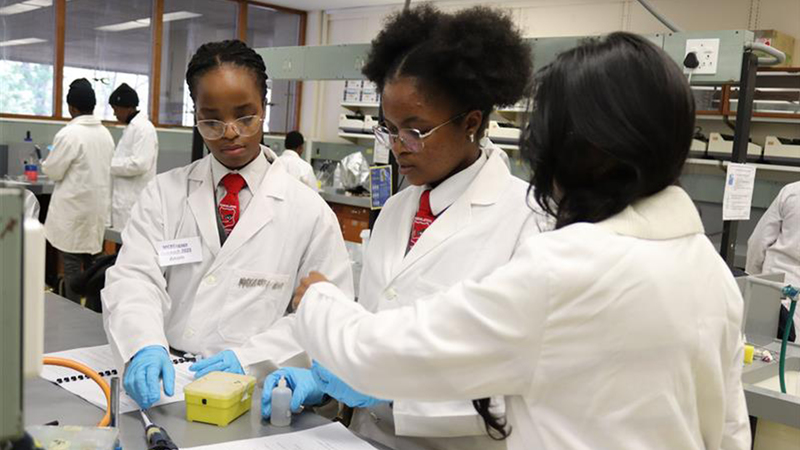A transformative step towards scientific inclusion
28 July 2025 | Story Stephen Langtry. Photos Supplied. Read time 5 min.From 16 to 18 July, the Department of Molecular and Cell Biology (MCB) at the University of Cape Town (UCT) hosted MCBEngage, a three-day job shadowing programme that represented a vital step toward widening access to science education and careers.
About 60 matriculants from three high schools in KwaLanga (Kulani High School, Ikamvalethu Secondary School, and Isilimela Secondary School) took their first steps into the world of molecular and cell biology through this initiative.
“This is our first job shadowing programme, which is organised by the Transformation Committee within the Molecular and Cell Biology department,” said Dr Sandiswa Mbewana, the director of the Biopharming Research Unit. “We are here to give you an experience of what it is like in a lab,” she said as she addressed the Grade 12 learners.
The aim of MCBEngage is to close the opportunity gap for learners from historically disadvantaged communities by providing hands-on lab experience, mentorship, and exposure to career pathways in science. Over the three days, learners were immersed in a dynamic, supportive, and inspiring environment; one where their curiosity was met with enthusiasm, their questions encouraged, and their futures reimagined.
Entering the lab
The programme began on 16 July with a welcome from Dr Mbewana, who framed the experience as more than just a tour; it was a doorway into possibility. Industry representatives from Watchmaker Genomics and Eppendorf followed with presentations on the career prospects available to graduates in molecular and cell biology, showcasing the diversity of scientific careers that reach well beyond academia.
“We want them to know that science isn’t just theory. It’s a way of solving real-world problems.”
Learners then received training in lab safety, with emphasis on the importance of personal protective equipment (PPE), proper use of laboratory tools, and basic protocols. They wore lab coats, gloves, and goggles, and began to engage directly with lab techniques. They extracted DNA from bananas, a simple yet powerful introduction to molecular biology.
It was an unforgettable moment for many. “I didn’t think science could be this fun,” said a learner from Kulani High School. This hands-on activity demystified science, showing it as both approachable and exhilarating. The day continued with a session on microscopy. Learners prepared slides of their own epithelial cells, baker’s yeast, and onion cells, learning how to compare different types of eukaryotic cells and handle compound microscopes.
Seeing the invisible
The second day opened with a panel discussion featuring scientists from diverse backgrounds. Dr Sam McCarren, Dr Goodman Mulondo, Dr Naadirah Moola, and Zizipho Yekelo shared personal journeys into science. Following the panel discussion, learners returned to the lab. This time, the microscope work deepened into environmental science. They examined live micro-organisms from contaminated water and learned to distinguish between Gram-positive and Gram-negative bacteria. These experiences encouraged students to connect microbiology to public health and environmental issues – bringing home the relevance of science to their everyday lives.

The day ended with a new experiment: investigating the effects of antiseptics and disinfectants on microbial growth. Using Dettol, Jik, and Cleen Green, learners tested how these substances impacted bacteria such as E. coli and M. luteus, and measured zones of inhibition. They saw first-hand how the application of scientific knowledge contributes to better hygiene, infection control, and public health. “We want them to know that science isn’t just theory. It’s a way of solving real-world problems,” said one of the lab coordinators.
Vision and belonging
The final day brought the programme full circle. In the morning, learners reviewed the results from their microbial control experiments and participated in a question-and-answer session with lab mentors, reflecting on what they had learned and observed. Then came the tours: first to the Faculty of Health Sciences, hosted by the Medical Virology Group, and later through the MCB department itself, led by the Postgraduate Representative Council. The programme ended with an awards ceremony.
“I want to ignite the fire within them for science because they are already science scholars.”
With many learners from under-resourced schools still struggling to see themselves as future biologists, researchers, or technicians thanks to South Africa’s past of entrenched inequality, the MCBEngage programme seeks to address this. “I want to ignite the fire within them for science because they are already science scholars,” said Dr Mbewana. “That fire must keep burning so that they continue in the field of science.”
Participants felt that the success of MCBEngage lay in the blend of practical science, exposure to university life, and meaningful human connection. For the learners, the impact was immediate. As Leo Ntlebi, a matriculant at Isilimela Secondary School put it, “When I came here, it was so fantastic because I got to see different professionals who just gave their experience and what they studied [at university] to get where they are … it just deepened my understanding – not just about science but the variety of science.”
 This work is licensed under a Creative Commons Attribution-NoDerivatives 4.0 International License.
This work is licensed under a Creative Commons Attribution-NoDerivatives 4.0 International License.
Please view the republishing articles page for more information.











